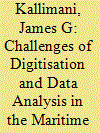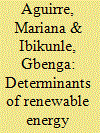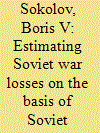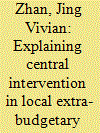|
|
|
Sort Order |
|
|
|
Items / Page
|
|
|
|
|
|
|
| Srl | Item |
| 1 |
ID:
132692


|
|
|
|
|
| Publication |
2014.
|
| Summary/Abstract |
This article presents the results of a survey on the feasibility of, and difficulties in, establishing a locally CSP manufacturing industry in Morocco. First, the survey explores which specific components of the CSP production chain could be manufactured in Morocco today and which would require moderate or significant changes being made in that country over the next decade. This paper contributes to demonstrating the potential for a CSP manufacturing industry in Morocco at the present time, ideal business models and current restrictions. Second, on the one hand this survey provides insight into the entrepreneurial, policy- and market-related barriers hampering the development of this industry and, on the other, the relative advantages offered by Morocco for the development of a CSP sector. Complementing the empirical findings on foreign direct investment determinants, this exercise stresses the key relevance of the economic context not only in terms of size, stability and predictability of the market, but also in regard to the critical importance of institutional and policy-related issues such as stability and public policy commitment. The results show that prior experience of firms in developing areas is a crucial issue in the accurate assessment of the risks and benefits associated with FDI decisions
|
|
|
|
|
|
|
|
|
|
|
|
|
|
|
|
| 2 |
ID:
132644


|
|
|
|
|
| Publication |
2014.
|
| Summary/Abstract |
This paper explores the causal relationship between economic growth, trade openness and energy consumption using data of 15 Asian countries. The study covers the period of 1980-2011. We have applied panel cointegration and causality approaches to examine the long-run and causal relationship between variables.
Empirical results confirm the presence of cointegration between variables. The impact of economic growth and trade openness on energy consumption is found to be positive. The panel Granger causality analysis reveals the bidirectional causality between economic growth and energy consumption, trade openness and energy consumption.
|
|
|
|
|
|
|
|
|
|
|
|
|
|
|
|
| 3 |
ID:
162736


|
|
|
|
|
| Summary/Abstract |
The volume of collected and synthesised data available to governmental leaders assessing the maritime domain has increased rapidly over recent years. Analogue data has given way to digital data, which provides an opportunity for better storage, analysis and transfer. Data infusion and management has become the key constraint in respect of data collection. Using data to make decisions requires the appropriate tools and processes to assess and transfer data to near real-time user domains. In the maritime environment, there is a constantly growing demand for intelligence, surveillance and reconnaissance (ISR) data for both national security and commercial purposes, including data sharing among partner nations. However, an increase in available data does not automatically equate to an increase in decision-ready information. Rather, the increase in data can overwhelm sensors, databases and analysts. The concept and use of “big data” exacerbate the already overwhelming flow of data in terms of the volume, variety, and velocity of the data being received. This paper will explore the digitisation of the maritime domain, and the prospect of performing data analysis in a world of rapidly growing data.
|
|
|
|
|
|
|
|
|
|
|
|
|
|
|
|
| 4 |
ID:
132672


|
|
|
|
|
| Publication |
2014.
|
| Summary/Abstract |
We investigate factors influencing country-level renewable energy growth by applying FEVD and PCSE estimation methods in a unique sample analysis. With a longer time series (1990-2010) and a broader sample size of countries (including Brazil, Russia, India, China and South Africa) than previous studies, our results reveal new insights. The results suggest that certain government-backed energy policies impede renewable energy investments, thus implying significant failures in policy design. These policies may be failing mainly because of uncertainty and the likelihood of discontinuity. Weak voluntary approaches are introduced in order to satisfy public demand for more sustainable investments and programmes; we find that these may have negative influences on the growth of renewables as well. The insight gained is consistent over the estimation methods employed.
|
|
|
|
|
|
|
|
|
|
|
|
|
|
|
|
| 5 |
ID:
132651


|
|
|
|
|
| Publication |
2014.
|
| Summary/Abstract |
This paper uses Q methodology to reveal stakeholder perceptions on how best to address energy issues in Africa. We sampled a group of stakeholders involved in various energy sub-sectors to uncover perspectives on how to achieve and promote access to modern energy, energy efficiency and renewable energy in Africa, whether the perceptions could be correlated to educational or geographical background and implications such patterns could have on policies and current dialogues.
We found that all stakeholders agree on the need to prioritise sustainability but had different views on how to achieve sustainable energy for all in Africa, depending on the relevance given to each energy driver. Stakeholders could be categorised into four groups: (I) preference of large-scale high-impact projects; (II) supporters of targeted sectoral solutions with preference for small-scale technology and microfinance; (III) supporters of centralised solutions with preference for grid extension, and (IV) supporters of local entrepreneurship with scepticism about centralised solutions. The results show that differences in stakeholders' perceptions can be associated with respondents' educational but not geographical background. This implies that dialogues on energy in Africa should focus on inter-disciplinary understanding while further examining the trans-continent consensus that appears to have been established.
|
|
|
|
|
|
|
|
|
|
|
|
|
|
|
|
| 6 |
ID:
129738


|
|
|
| 7 |
ID:
132636


|
|
|
|
|
| Publication |
2014.
|
| Summary/Abstract |
In recent years, sustainability has represented one of the most important policy goals explored in the environmental Kuznets curve (EKC) literature. But related hypotheses, performance measures and results continue to present a challenge. The present paper contributes to this ongoing literature by studying two different EKC specifications for 10 Middle East and North African (MENA) countries over the period 1990-2010 using panel data methods. For the first specification, namely EKC, we show that there is an inverted U-shape relationship between environmental degradation and income; while for the second specification, namely modified EKC (MEKC), we show that there is an inverted U-shape relationship between sustainability and human development (HD). The relationships are shaped by other factors such as energy, trade, manufacture added value and the role of law. More interestingly, findings from the estimation show that EKC hypothesis, HD and sustainability are crucial to build effective environmental policies.
|
|
|
|
|
|
|
|
|
|
|
|
|
|
|
|
| 8 |
ID:
133763


|
|
|
|
|
| Publication |
2014.
|
| Summary/Abstract |
The problem of calculating the Soviet losses in the Second World War has confronted scholars with potentially insoluble difficulties. Especially in the first year of the war, during the catastrophic defeats and disorganized retreats, individual records on Soviet military personnel were either simply not kept or were lost or destroyed. Even during the war, the Soviet government criticized the failure to keep casualty lists up to date and noted that often soldiers were killed or went missing even before they were formally added to the unit rosters. The Red Army had no equivalent to the dog tag. Many soldiers, out of superstition, refused to wear the smertniki-little wooden cases that held identification information on slips of paper-believing that a wearer was ordained to die. Official estimates to this date, however, appear plainly understated. The author proposes a new method for estimating the Soviet personnel losses in the Second World War, based on the 1939 and 1956 censuses of the Soviet population.
|
|
|
|
|
|
|
|
|
|
|
|
|
|
|
|
| 9 |
ID:
105223


|
|
|
|
|
| Publication |
2011.
|
| Summary/Abstract |
Chinese local governments widely resort to extra-budgetary exaction to finance themselves, which generates side effects that necessitate central intervention. Through statistical analysis, this paper finds that the central government intervenes only selectively, following a logic driven by economic development and political stability.
|
|
|
|
|
|
|
|
|
|
|
|
|
|
|
|
| 10 |
ID:
127917


|
|
|
|
|
| Publication |
2014.
|
| Summary/Abstract |
Along with climate change and affordability, concerns about energy security are key drivers behind proposals for major energy system change in the UK and numerous other countries. Unlike climate change we know very little about how the public thinks and feels about this aspect of sustainability and energy policy. Beyond engaging critically with conceptual and theoretical discussions, empirical data from two surveys (Cardiff postal survey, N=520; online UK survey, N=499) using a ten item energy security scale are presented and discussed. Here we show that aspects of energy security are certainly of concern to the UK public, with particularly high concern around dependence on fossil fuels/imports and relatively lower expressed concern for actual disruption of energy supply. However public concerns around energy security are only emerging, and likely to change depending on the context in which it is discussed (e.g. in comparison to climate change). In addition, findings from public interviews are used to further contextualise the survey findings, showing unfamiliarity among the UK public with regards to the term "energy security". We discuss implications, and further work that would be useful for understanding public perceptions in more dept
|
|
|
|
|
|
|
|
|
|
|
|
|
|
|
|
| 11 |
ID:
133194


|
|
|
|
|
| Publication |
2014.
|
| Summary/Abstract |
We examine the effect of family income on child health using data from the China Health and Nutrition Survey. We find a significant child health/family income gradient for the overall sample of Chinese children. Our preferred specification shows that the income gradient increases with child age until the age of 12. We find that parental health consciousness, household sanitation conditions and nutrition intake are the channels through which family income affects child health. After controlling for these transmission channels, the gradient strengthens with child age until the age of 17. We find that children from poorer families in China are not only more likely to experience several types of chronic illnesses, but also less likely to address effectively some health conditions. The income gradient is found to be very heterogeneous, with greater effect on children with poorer health, girls and children in rural China.
|
|
|
|
|
|
|
|
|
|
|
|
|
|
|
|
| 12 |
ID:
127906


|
|
|
|
|
| Publication |
2014.
|
| Summary/Abstract |
There is an increasing body of research on consumer preferences concerning electricity from renewable resources. The purpose of this study is to analyze how providers' online marketing in one of the most developed markets for green energy can be improved. We conducted a content analysis of nearly 480 providers' websites, examining as many as 620 products. We found that energy providers' communication seems to be in line with academic research on potential customer benefits (utilitarian benefits, "warm glow", nature experience). However, communication could be improved by giving more detailed information on the impact of the consumer's decision, e.g. by giving numbers on CO2-emissions saved. Moreover, providers could improve the effectiveness of their visual messages by using more pictures related to renewable energy. Further, self-expressive benefits of buying green energy could be created by offering merchandise articles symbolizing the contribution a consumer makes by choosing a green tariff. When comparing purely green energy providers to other providers, we found that the former offer a wider choice as well as more products supporting new renewable installations. Important implications for policy makers aiming to phase out alternative energy subsidies emerge from our findings.
|
|
|
|
|
|
|
|
|
|
|
|
|
|
|
|
| 13 |
ID:
132542


|
|
|
|
|
| Publication |
2014.
|
| Summary/Abstract |
It is no secret in healthcare today that electronic data capture leads to better policies, better programs, and better outcomes. This understanding paved the way for Electronic Medical Record (EMR) solutions which generate complete records of clinical patient encounters, supporting evidence-based treatments, strategic quality management initiatives, and clinical outcomes reporting. Each of these capabilities gives clinical and administrative healthcare staff actionable data for improving patient care. EMR solutions are equally important in remote and underserved areas as they are in wealthy states and nations, due to the fact that health disparities most notably affect subpopulations. According to a 2012 report from the Agency for Healthcare Research and Quality, "racial and ethnic minorities and poor people often face more barriers to care and receive poorer quality of care when they can get it." EMRs can thus provide a benchmarking tool to drive quality improvements, and identify these trends to ensure that local and national authorities can improve care for subpopulations.
|
|
|
|
|
|
|
|
|
|
|
|
|
|
|
|
| 14 |
ID:
045086


|
|
|
|
|
| Publication |
London, George Allen and Unwin Ltd., 1970.
|
| Description |
137p.Hbk
|
| Standard Number |
0047110023
|
|
|
|
|
|
|
|
|
|
|
|
Copies: C:1/I:0,R:0,Q:0
Circulation
| Accession# | Call# | Current Location | Status | Policy | Location |
| 008038 | 711.4072/BUR 008038 | Main | On Shelf | General | |
|
|
|
|
| 15 |
ID:
132642


|
|
|
|
|
| Publication |
2014.
|
| Summary/Abstract |
In devising viable energy efficiency policies that can reduce the greenhouse gas emissions of existing dwellings (e.g. UK×s Green Deal), data are required on current insulation levels and its influences. One such data source is the seldom used UK Energy Saving Trust×s Homes Energy Efficiency Database (HEED), which this paper investigates using Norfolk UK local authorities as a case study. The HEED×s reactive and longitudinal data collection strategies contribute to underlying biases, which is the likely reasoning for its differences with the English Housing Survey and UK 2001 Census. These differences had a cascading effect in that they manifested themselves in the indicative financial and carbon assessments undertaken. Similarly, sampling concerns also implicated correlations surrounding influences of current dwelling insulation levels. Providing one is transparent about potential biases and data concerns, the HEED can play a substantial role in guiding policy decisions and understanding dwelling stock characteristics (e.g. what makes dwellings 'Hard to Treat×). In particular, its vast (national) geographic coverage yet high resolution enables local context to be explored: a factor that this study shows to significantly shape insulation levels.
|
|
|
|
|
|
|
|
|
|
|
|
|
|
|
|
| 16 |
ID:
134009


|
|
|
|
|
| Publication |
2014.
|
| Summary/Abstract |
Surrender, or capitulation to the adversary in combat, can have a significant impact on the duration, intensity, and outcomes of battles and wars. Yet the reasons why soldiers choose to capitulate are not well understood. This article advances a new theory of surrender that argues soldiers are most likely to surrender when they perceive proximate environmental signals leading them to expect humane treatment and a relatively short period of captivity and least likely to give up when those signals lead them to expect abusive treatment and lengthy imprisonment. The model is tested through a detailed examination of surrender rates in World War I and findings indicate that it explains more of the observed variation than do existing theories of capitulation. What little systematic data exists on surrenders during twentieth century interstate wars corroborates these findings. Implications for scholars and policymakers are briefly considered.
|
|
|
|
|
|
|
|
|
|
|
|
|
|
|
|
|
|
|
|
|